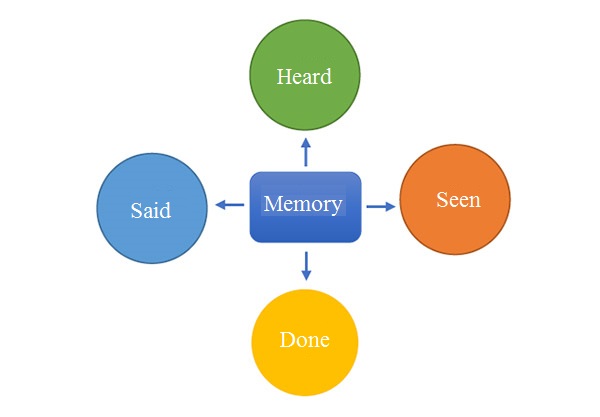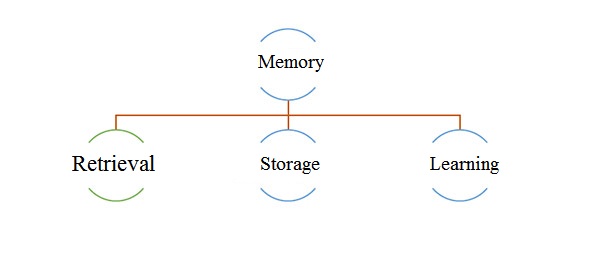Oral History Workshop – 2
Memory
Shahed Yazdan
Translated by M. B. Khoshnevisan
2022-12-13
The oral history website is going to provide the educational materials of some oral history workshops to the audience in written form. The present series has been prepared using the materials of one of these workshops. As you will see, many of the provided contents are not original or less said contents, but we have tried to provide categorized contents so that they can be used more.
Memory
What the narrator has seen, heard, said or done is called memory.

For example, if the narrator says: "I captured several people in the Karbala operation 5", it is a memory, but if he says: "In the Operation Val-Fajr, the combatants achieved victory", it is a knowledge.
In memory, the subject is the narrator.
Memory is classified based on different models. In a division, memory is divided into oral or written.
In another type of classification, memory is divided into absolute and bound.
An absolute memory is a memory that has no boundary. For example, the narrator says: "One of my comrades and I went on a night operation and destroyed a tank and came back." This is an absolute memory, but in order for this memory to be useful for oral history, it must be bound to place, time, description and all its surrounding points. In this example, the narrator must specify which operation at night, on what date, with what weapon, with whom, etc., has been carried out so that it can be used in oral history.
In oral history, the bound memory is useful; but absolute memory is also used in storytelling. Absolute memory in oral history is weak because it cannot be verified.[1]
Another division of memory in terms of form is literary memory and historical memory. Literary memory describes, for example, "a beautiful summer moonlit night..." but if the same part of the memory is said in this way that "the fourteenth night of the lunar month coincided with ... and the moon was shining in the sky..." This kind of memory will be historical.
For oral history, we need bound oral memories in historical form, and if we can extract this type of memory from the narrator's mind, we will reach the desired result.

Although it is easy to say, even the best interviewers will gain at most 20 minutes of pure memory within an hour. Since our opposite party (narrator) is a human being, it will not be an easy task to obtain memories that are favorable to us.
In the discussion of memory, there are two other definitions of memory and narration, which are mostly mentioned in universities (especially the science of psychology), and since we are dealing with them in the following discussion, they need to be defined.
Memory is our mind, but all the events that happened to us during our lifetime have not remained in our mind and we only remember a part of them. According to psychologists, the whole mind is memory, and what remains in our memory is called memory. What we express from that memory is also called narration.
In oral history, the purest raw material is to get an accurate narration from memory. It is very difficult to get an accurate narration, and the narrator may narrate a single memory in different ways at different times according to different conditions.
Narration of memory by people changes in different situations. The best narration is the one that is narrated without any love or hatred and with the accuracy of memory. This is one of the difficulties of oral history and it is the hard work that must be done to get accurate narrations from pure memories.
The memory of every person has three parts: learning, storage and retrieval. The art of the interviewer in an interview is to activate the retrieval part. If we can activate the narrator's mind to retrieve his or her memories, we will succeed.
Number of Visits: 3225








The latest
Most visited
- Third Regiment: Memoirs of an Iraqi Prisoner of War Doctor – 8
- 100 Questions/7
- The 372nd Night of Memoires– Part 2
- The Role of Objects in Oral Narrative
- 100 Questions/ 8
- Pak-Setan (Clean-Seeker)
- Third Regiment: Memoirs of an Iraqi Prisoner of War Doctor – 9
- The Relationship between “Religious Jurisprudence” and “Oral History”
Challenges of Interviewing in Oral History
After years of studying the theoretical foundations of oral history, conducting numerous interviews and going through their post-interview stages, as well as reading the available body of oral history literature, I was eventually given the opportunity to evaluate the edited versions of dozens of oral history projects.Comparing the Narratives of Commanders and Ordinary Combatants in the Sacred Defense
An Analysis of Functions and ConsequencesThe experience of the Sacred Defense cannot be comprehended merely through statistics or official reports; what truly endures from war are the narratives of those who stood upon its frontlines. These narratives, however, vary significantly depending on one’s position, responsibilities, and lived experience.
Unveiling of the book "Oral History: What and Why"
The First report: Alireza KamariAccording to the Oral History website, the unveiling ceremony of the book "Oral History: What and Why" by Hamid Qazvini was held on Sunday evening, November 24, 1404, in the presence of experts in the field of oral history in the Salman Farsi Hall of the Arts Center.



